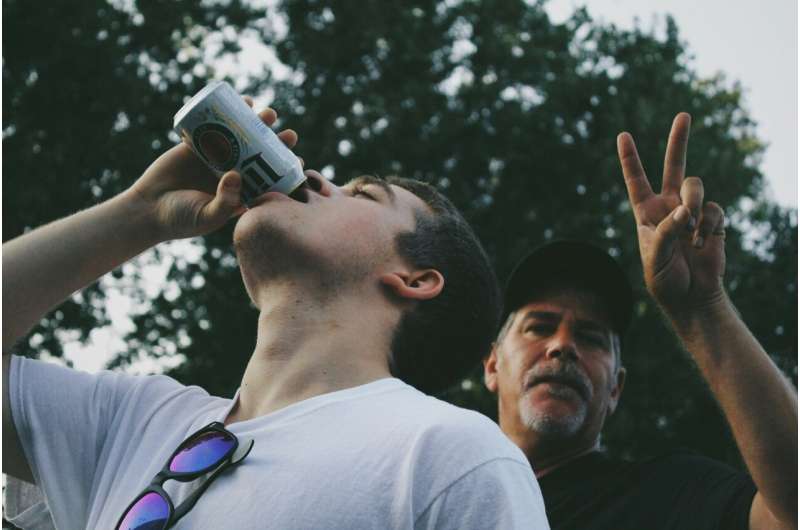
Credit: Unsplash/CC0 Public Domain
A new study finds that when adolescents who have been abused use alcohol and drugs to cope with their negative feelings, their risk of developing problematic substance use increases significantly.
The study was led by the University of Cape Town in collaboration with researchers from the Universities of Exeter and Stellenbosch. The title is: “Coping Motives as a Mediator of the Relationship between Child Maltreatment and Substance use Problems in South African Adolescents” and published in Child abuse and neglectThe research was conducted at several schools in Cape Town by Masters student in Psychology Ayesha Assim and Associate Professor Debbie Kaminer.
“Understanding how and why childhood maltreatment experiences lead to increased risk of substance abuse is critical, so that we can develop targeted interventions early to improve long-term outcomes for maltreated young people,” said Associate Professor Lee Hogarth from the University of Exeter.
Previous studies have shown that young adults who experienced childhood maltreatment are more likely to abuse substances when their alcohol or drug use is driven by coping motives—the belief that substances will help them deal with feelings of anxiety, depression, or distress. In contrast, those who use substances for social connection, pleasure, or to conform to peer pressure are less likely to develop problematic patterns of use.
Until now, it has been unclear how early this risk pathway begins, as the harms that coping motives entail relative to other motives for substance use have rarely been examined in adolescents. This is a critical gap in our understanding, as the earlier interventions to address substance abuse can be implemented, the better the long-term outcomes will be.
The study included 688 high school students between the ages of 13 and 18. Researchers collected information on childhood maltreatment experiences, alcohol and marijuana use, motives for this use, and problematic behaviors that resulted from this use. Among the 26% of participants who reported alcohol use and the 20% who reported marijuana use, a history of childhood maltreatment significantly predicted the severity of substance-related problems. In addition, the use of coping motives explained a significant portion of this relationship.
“Adolescents who experience abuse are more likely to experience anxiety, depression and stress than other teenagers. At the same time, they often have less effective strategies to deal with these emotions because they are not good role models and their parents do not respond well to emotions,” explains Associate Professor Hogarth.
“As a result, they are more likely than non-abused adolescents to turn to substances to manage their negative feelings. Unfortunately, using substances to cope is likely to increase problems in life, exacerbating feelings of distress and creating a vicious cycle.”
The study found that using alcohol or marijuana to fit in with peers also plays a role in increasing the risk of problematic alcohol use, but less so than coping motives.
“These findings highlight the critical importance of understanding the underlying motivations behind substance use among adolescents who experienced childhood maltreatment,” said Associate Professor Kaminer. “By identifying coping motives, and to a lesser extent conformity motives, as important mediators, we can better target interventions that address these underlying psychological drivers.”
The implications of this research extend beyond academic research and suggest practical applications for public health and psychoeducational initiatives aimed at preventing substance abuse among vulnerable youth.
“The study findings clearly demonstrate that equipping maltreated adolescents with more effective coping skills to manage their difficult feelings may be vital to reducing problematic substance use,” said Associate Professor Kaminer. “Investing in such early intervention programs may yield long-term health and mental health benefits for the well-being of young people who have been maltreated.”
More information:
Ayesha Assim et al, Coping motives as a mediator of the relationship between child maltreatment and substance abuse problems in South African adolescents, Child abuse and neglect (2024). DOI: 10.1016/j.chiabu.2024.106885
Quote: Research helps unravel link between child maltreatment and substance use among adolescents in South Africa (2024, July 1) Retrieved July 1, 2024 from https://medicalxpress.com/news/2024-07-untangle-link-childhood-maltreatment-adolescent.html
This document is subject to copyright. Except for fair dealing for private study or research, no part may be reproduced without written permission. The contents are supplied for information purposes only.
 Healthy Famz Healthy Family News essential tips for a healthy family. Explore practical advice to keep your family happy and healthy.
Healthy Famz Healthy Family News essential tips for a healthy family. Explore practical advice to keep your family happy and healthy.


